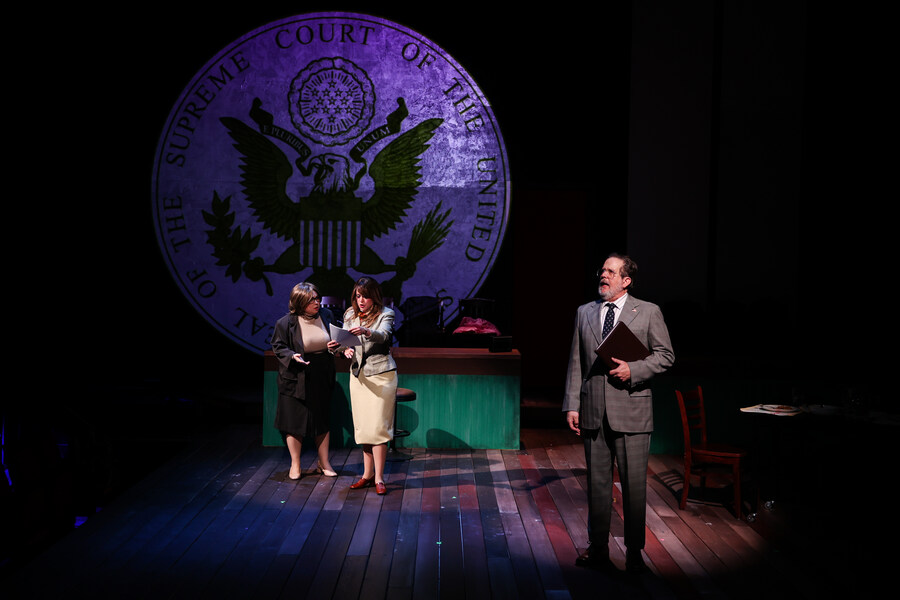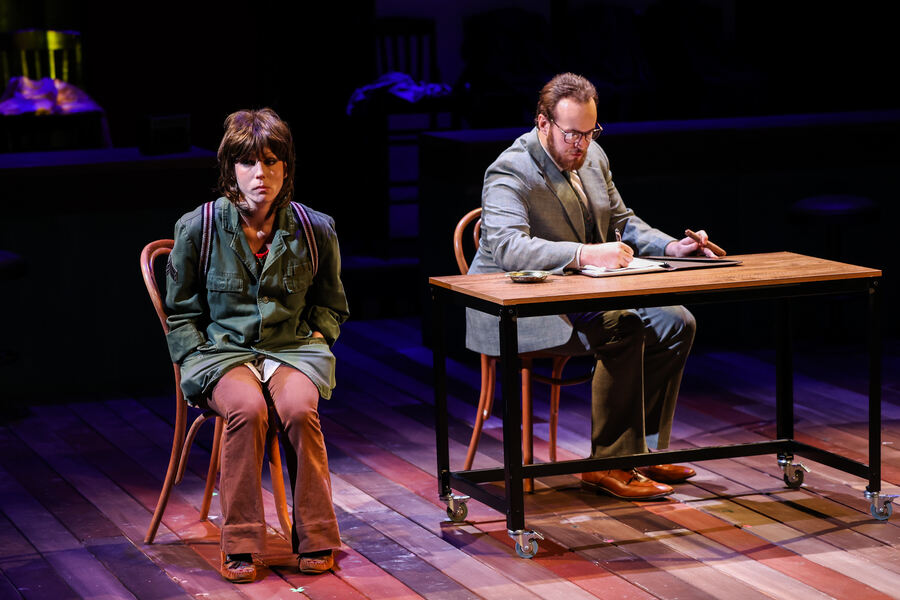The email from Houston theatre company Stages went out to patrons on Jan. 11, nine days before performances began for their production of Roe, Lisa Loomer’s reproductive rights drama highlighting the human stories behind the landmark 1973 Roe v. Wade case.
“Telling this story is an act of courage,” read part of the letter. “It will take tenacity for us to forge ahead in the face of inevitable criticism from those who believe this show has no place in Houston…There are no villains in this story, there are no ‘two sides’—there are a multitude of people and all are included.”
It was definitely not the customary cheerleading pre-show marketing push. But when you’re dealing with the topic of abortion in Texas, there’s no such thing as easygoing. Indeed, Stages is helming the first full production of the play since the Supreme Court’s Dobbs decision led to changes in abortion laws around the country, including in Texas. Loomer’s play has had its share of changes as well.
Roe chronicles the divergent lives of Texas natives Sarah Weddington, who argued the case at the Supreme Court, and plaintiff Norma McCorvey (“Jane Roe”) in the years following the court’s monumental ruling. Centered not on the case itself but rather on the people behind it, Loomer’s drama attempts to decenter the politics and focus on the women as a method of examining this historical yet still ongoing issue.
“The convention of the play is that it starts in the present, where you actually are, with Sarah and Norma speaking to the audience,” Loomer said. “And the play ends in the present. The problem is that the present keeps shifting.” Which means that Loomer feels obligated to update these portions of her play every time the needle moves. The show, which premiered at Oregon Shakespeare Festival in 2016, has since been seen at the Arena Stage in Washington, D.C., Berkeley Repertory Theatre, and the Goodman Theatre in Chicago.

While the revisions Loomer made to her play between 2016 and 2022 reflected changes in the political climate that endangered the right to choose that was insured by Roe v Wade, post-Dobbs her changes became more urgent. Loomer gave audiences a taste of the new iteration during a staged reading at the Fountain Theatre in Los Angeles, assembled as a call to action, that played right before, during, and after the decision.
“I wrote two different endings in June, just in case”, said Loomer. “What I didn’t anticipate was the feelings of the audience—what they needed from the character of Sarah Weddington when the decision came down. And I kept changing that ending in the days after the decision.”
What audiences wanted was a stronger call to action from the play, which is something Loomer allowed Sarah’s character to deliver.
“I don’t like to resort to heroes and villains—my aim is always to increase our compassion for the complexity of the human condition, and I don’t want to contribute to the divide in this country,” Loomer said. “But in this ‘present,’ Sarah Weddington has the last word in the play, because choice is no longer the law of the land. And what she is saying, right now, is that we still have a choice as to what to do about that.”
The ability to choose is of particular interest to the Houston residents attending this production of Roe. Last summer’s Dobbs decision, giving individual states authority to regulate abortion, cleared the way for Texas to ban almost all abortions outside of narrow exceptions for patient health. Additionally, criminal penalties for performing an abortion are now increased up to life in prison, with a civil penalty of no less than $100,000 per abortion performed.
That this iteration of Roe is now playing at this specific time, in the state where the original case started, is not lost on Loomer or the folks at Stages.
“When we programmed Roe for this season it was pre-Dobbs, and I was in a bit of denial,” admitted Kenn McLaughlin, Stages’ artistic director. Since the end of Roe with Dobbs, he feels “it’s critically important that we start from the beginning again and look at this story. Who were these human beings and how did we get here?”
Said Loomer, “It’s daunting yet very moving to me to have the play in Texas now. In some senses, it’s what I’ve always wanted. In my mind, theatre is getting together people who would never meet, with quite different world views, sitting together in the dark contemplating an issue. I’ve seen Roe done in theatres were there are Christian right people and liberal feminists. My hope is that both will attend in Texas.”
According to Katie Maltais, Stages’ managing director, there has indeed been a range of reactions at performances. The most vocal reactions are overwhelmingly people reacting positively to moments of the show that lean toward support of a woman’s right to choose. But Maltais also said she’s overheard lobby conversations from folks voicing every position on the issue.
“In an interesting anecdote, I was speaking to a woman the other day who was unsure of her friend’s thoughts on women’s reproductive rights,” said Maltais. “She decided to invite her to Roe as a way of unlocking that conversation. The play served as a way for the two women to have an open discussion on the topic and find alignment where it existed. Instead of dissolving into rhetoric, they discussed Sarah and Norma and the other women in the play.”
Maltais also pointed out that the overwhelming number of Americans are pro-choice, and this is just as true in Houston. Not everyone in Houston is thrilled about the production, but thus far, reaction has been respectful and incident-free, not requiring any extra security or precaution for the theatre.
McLaughlin noted that some regular patrons decided not to see the show for a variety of reasons, but while this loss doesn’t fluster him, it does make him sad. “It’s a shame that some people aren’t willing to see a show just because it might not affirm all their values,” said McLaughlin. “We believe Stages audiences are willing to get uncomfortable. After all, our motto is: We come together in the dark to learn how to love each other in the light.”

Texans will get another chance to see Roe in April, when Austin’s ZACH Theatre will produce the show. Geographically, the Austin production has an even deeper connection with the play: Sarah Weddington went to law school at the University of Texas and lived in Austin while challenging the anti-abortion statues in the Dallas district court, prior to the Supreme Court. After arguing Roe v. Wade, Weddington was elected to the Texas House of Representatives three times, and later founded the Weddington Center in Austin, where she taught at the UT Law School for 28 years.
“There is tremendous interest here in Lisa Loomer’s play because Ms. Weddington was a longtime Austin resident,” said Dave Steakley, ZACH’s producing artistic director, who added that the progressive nature of Austin has always been at odds with its place as the capital city and home to the Texas legislature.
Steakley doesn’t believe that Roe will change anyone’s point of view on the subject, but he does hope that the production provides a forum for conversation with empathy. “We also see it as an educational opportunity,” said Steakley; the show, he believes, has chance to reach younger citizens who may be less well acquainted with the history but who nevertheless find themselves in the center of the debate about reproductive health.
Whether in Houston or later in Austin, Loomer hopes that people realize that her play examines choice rather than prescribing what choice to make. Because it’s in Texas right now, though, she knows it has the chance to speak to women most at risk at this moment.
Still, Loomer can’t help but be wistful.
“I find it fascinating that Roe is now playing in a state where you can’t tell someone to take a vaccine but you can tell them they can’t have an abortion.”
Jessica Goldman (she/her) is a theatre critic for Houston Press. Prior to moving to Houston eight years ago, she was the theatre critic for The Eyeopener on CBC Radio in Calgary.


